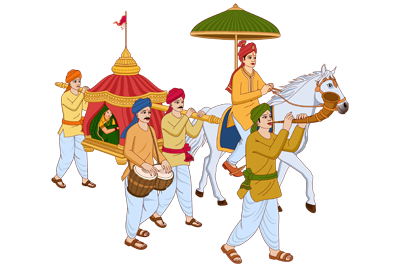





Various factors are considered while finding auspicious Hindu Marriage Dates. It is a quite tedious process and one should read this article to understand how marriage dates are calculated. This article will clarify what factors are considered and what factors are left while calculating Vivah Muhurats on DrikPanchang.com.
In Marriage Election, only solar months are considered except Chaturmas which is a period of four lunar months when Lord Vishnu goes to sleep.
Many sources publish different South Indian and North Indian marriage dates. As for marriage election, only Solar months are considered, there should not be two different set of marriage dates for Lunar and Solar calendars.
Published marriage dates should be valid for all Hindu Calendars including both Lunar and Solar Calendars. As Lunar months are not considered both Purnimanta and Amanta calendars should have same marriage dates. Bengali Calendar, Tamil Calendar, Malayalam Calendar and Odia Calendar are Solar Calendars.
According to Muhurta Chintamani, marriages should be held only when the Sun is transiting through following Rashis

Marriages should not be held when the Sun is transiting through following Rashis
Dhanu/Sagittarius month is also known as Kharmas when marriages are prohibited. Solar months Simha and Kanya overlaps with Chaturmas.
For marriage election only Solar months are considered. However marriage rituals are not held during Adhika Masa, Kshaya Masa and Chaturmas. Pitru Paksha or Mahalaya Shraddha period which is also prohibited for auspicious activities falls during Chaturmas.
List of Auspicious Nakshatras for Marriage
List of Prohibited Yoga for Marriage
Following 4 Karanas are prohibited for marriage
All above prohibited Karanas might cause death of the bride and the bridegroom. Marriage held during these Karanas might result in destruction of the family and sudden unexpected adverse results.
Remaining Karana, Kinstughna, Bava, Balava, Kaulava, Taitila, Garaja, Vanija are auspicious for marriage activities.
For marriage Monday, Wednesday, Thursday and Friday are considered auspicious. Tuesdays are not considered auspicious for marriages.
Dwitiya (2), Tritiya (3), Panchami (5), Saptami (7), Ekadashi (11) and Trayodashi (13) Tithis are best and Rikta Tithis Chaturthi (4), Navami (9), Chaturdashi (14) are bad and should be avoided.
Tithis and weekdays are given less important while selecting marriage dates. Hence our marriage calculations don't consider Weekdays and Tithis while doing Panchanga Shuddhi to find auspicious marriage dates.
It is interesting to note that most of the time Akshaya Tritiya, Prabodhini Ekadashi and Makar Sankranti falls on auspicious marriage days but that is not always true.
After Panchang Shuddhi marriage should be conducted during auspicious Ascendant. Ascendant is also known as Lagna and rising sign. Different sources have varying opinion on selecting auspicious Lagna.
Most sources believe that Gemini (Mithuna), Virgo (Kanya) and Libra (Tula) are the auspicious ascendants to conduct the marriage.
Marriage held during inauspicious Lagna might result in loss of employment, adulterous and Kulta wife, unable to conceive more than one child and unstable married life.
We don't consider Lagna or ascendant while publishing Vivah Muhurat. However our Muhurat window of at least four hours should be sufficient enough to find the auspicious Lagna. One Lagna lasts for approximately two hours and this duration varies from place to place.
Most auspicious works including marriage are prohibited when Shukra Tara and Guru Tara are set. Hence no marriages are held when Venus and Jupiter are combusted or Asta.
Singhast Guru is also considered inauspicious for marriage. But it should be considered diligently as Guru becomes Singhast for 12 to 13 months which makes it difficult to conduct the marriage for almost a year. However marriage can be performed during Singhast Guru when the Sun is transiting through Mesha (Aries) Rashi. Guru becomes Singhast once in every twelve years. Our marriage calculations don't consider Singhast Guru.
In North India marriages are also not held during Holashtak. Holashtak is eight days inauspicious period which starts from Ashtami Tithi during Shukla Paksha of Phalguna month and ends on Phalguna Purnima. Our marriage calculations don't consider Holashtak.